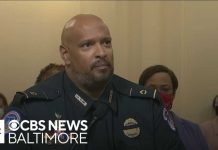
As the National Guard deploys to another crime-ridden city, concerns over government overreach and constitutional rights resurface among conservatives.
Story Overview
- The National Guard is being sent to cities plagued by crime, raising debates about federal intervention.
- Trump’s administration emphasizes restoring law and order, aligning with conservative values.
- Critics argue about the potential erosion of local governance and civil liberties.
- The deployment reflects ongoing frustrations with crime under previous administrations.
Federal Intervention in Crime-Ridden Cities
The deployment of the National Guard to cities struggling with crime marks a significant federal intervention under President Trump’s administration. This move aligns with conservative values emphasizing law and order, reflecting a commitment to addressing issues perceived to be neglected by previous administrations. Critics, however, voice concerns about the implications of such federal involvement on local autonomy and civil liberties, sparking a national debate on the balance of power.
The decision to send the National Guard comes amid frustrations with previous policies perceived as ineffective in curbing crime. The administration’s approach seeks to assert control and provide immediate solutions, resonating with constituents advocating for strong governmental action. Yet, this raises questions about the precedent such actions set regarding the federal government’s role in local governance and the potential erosion of constitutionally protected rights.
Impacts on Local Communities
The presence of the National Guard in urban areas significantly impacts local communities, both socially and politically. While intended to reduce crime rates, such deployments can alter the relationship between residents and law enforcement, potentially escalating tensions. Communities may experience increased security but at the potential cost of heightened surveillance and reduced civil liberties, affecting public perception of governmental authority.
In the long term, the presence of federal forces could influence local politics, as communities evaluate the effectiveness of these interventions. The administration’s actions highlight ongoing debates over state versus federal powers, with implications for future policy decisions regarding crime and public safety.
Political and Constitutional Considerations
President Trump’s decision to deploy the National Guard underscores a political strategy focused on crime reduction and restoring public confidence in safety. This move is seen as a corrective measure against what many conservatives view as the failures of previous administrations to address crime effectively. However, it also raises constitutional questions about the extent of federal authority in local matters, particularly concerning the Second Amendment and individual freedoms.
The ongoing debate reflects broader concerns over governmental overreach and the erosion of traditional values. As these deployments continue, the administration faces the challenge of balancing national security interests with preserving the constitutional rights that fundamentally define American society.


















